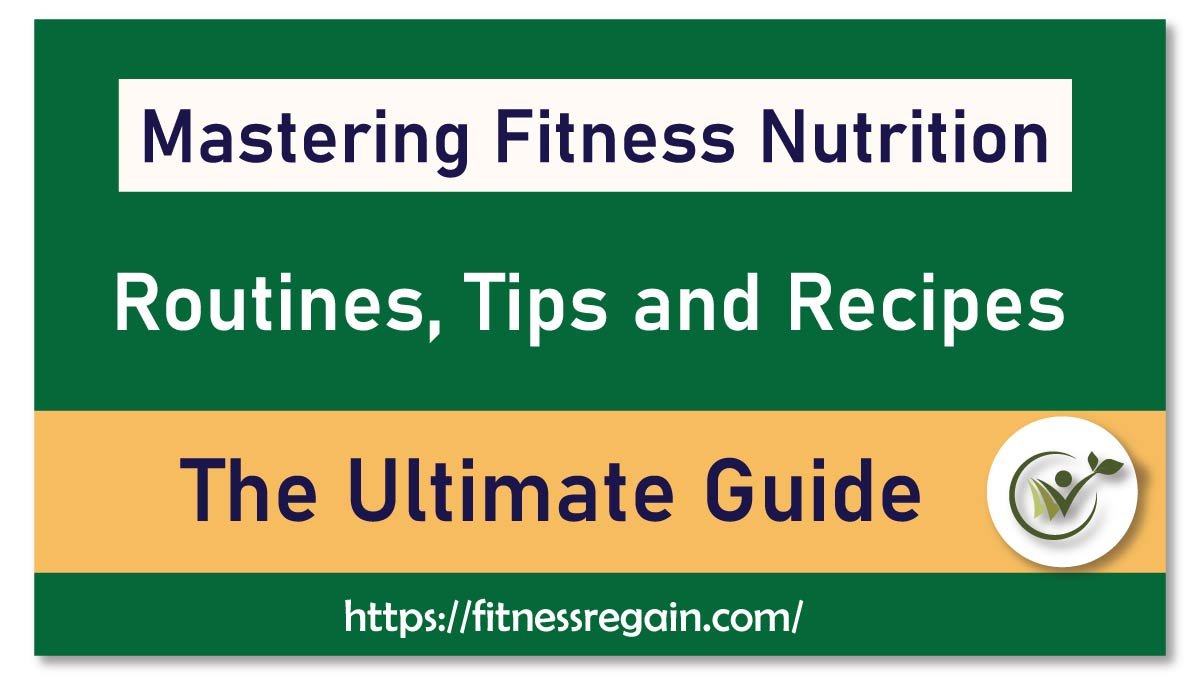Achieving peak physical health isn’t just about working out; it’s also about what you eat. Fitness nutrition is integral to optimizing your workouts, enhancing recovery, and supporting overall wellness. In this comprehensive guide, we will explore various nutrition plans, practical tips, and essential supplements. We’ll also debunk common myths and provide recipes and advice for beginners. Dive in to discover how you can tailor your nutrition to fuel your fitness journey effectively.
Fitness Nutrition Plan
Creating an effective fitness nutrition plan involves understanding your body’s specific needs and tailoring your diet to support your fitness goals. Here’s a simple plan to get you started:
Calculate Your Caloric Needs: To determine how many calories you need daily, use an online calculator to find your Basal Metabolic Rate (BMR) and adjust it according to your activity level. BMR is the number of calories your body needs at rest to maintain basic bodily functions. Once you have your BMR, factor in your physical activity level using the Harris-Benedict equation. For example, if you exercise moderately 3-5 days a week, multiply your BMR by 1.55. This will give you the total number of calories you need to maintain your current weight. To lose weight, create a caloric deficit by consuming fewer calories than your total, and to gain weight, create a surplus.
Macronutrient Breakdown: A balanced diet should consist of approximately 40% carbohydrates, 30% protein, and 30% healthy fats. Carbohydrates are the body’s primary energy source and should come from whole grains, fruits, and vegetables. Proteins are crucial for muscle repair and growth, and good sources include lean meats, fish, eggs, and legumes. Healthy fats, such as those found in avocados, nuts, seeds, and olive oil, support brain health and hormone production.
Meal Timing: Eating smaller, frequent meals throughout the day can help maintain energy levels and prevent overeating. Start your day with a nutrient-dense breakfast to kickstart your metabolism. A good example is oatmeal topped with berries and a drizzle of honey. Incorporate a pre-workout snack rich in carbs and protein to fuel your exercise, such as a banana with peanut butter. After working out, have a meal that includes both protein and carbohydrates to aid in recovery and muscle synthesis, like grilled chicken with quinoa and steamed vegetables.
Hydration: Drinking enough water is crucial for overall health and optimal physical performance. Aim for at least 8-10 glasses of water daily. During intense workouts, consider consuming electrolyte drinks to replenish the minerals lost through sweat, such as sodium, potassium, and magnesium. Hydration helps maintain energy levels, supports muscle function, and aids in recovery.
Following this plan helps ensure you’re fueling your body properly, supporting both performance and recovery.
Fitness Nutrition Guide
Fitness nutrition guide covers essential elements such as macronutrients, meal timing, hydration, and micronutrients:
Macronutrients: Focus on a balanced intake of proteins, carbohydrates, and fats. Proteins should come from sources like chicken, fish, tofu, and legumes. Carbohydrates should include whole grains, fruits, and vegetables to provide sustained energy. Healthy fats from avocados, nuts, and seeds are essential for hormone regulation and overall health.
Meal Timing: Eating breakfast within an hour of waking helps kickstart your metabolism. Plan balanced meals every 3-4 hours to maintain steady energy levels throughout the day. This approach helps prevent energy dips and keeps your metabolism active.
Hydration: Start your day with a glass of water and continue drinking consistently throughout the day. Incorporate hydrating foods like cucumbers, watermelon, and oranges into your diet. Proper hydration supports digestion, nutrient absorption, and muscle function.
Micronutrients: Ensure you get a variety of vitamins and minerals by including diverse fruits and vegetables in your diet. Micronutrients like vitamin C, vitamin D, calcium, and iron play vital roles in bodily functions and overall health.
Pre/Post-Workout Nutrition: Pre-workout, consume a meal or snack that includes carbs and a bit of protein, such as oatmeal with berries or a smoothie with spinach and banana. Post-workout, focus on protein and carbs for recovery, like a protein shake with banana or a turkey sandwich on whole grain bread.
Following this guide can optimize your nutrition to support your fitness efforts effectively.
Best Fitness Nutrition Supplements
Identifying the best fitness nutrition supplements can enhance your diet and workout results:
Protein Powder: Protein powders, such as whey, casein, or plant-based options, are ideal for muscle repair and growth. They provide a convenient way to increase your protein intake, especially post-workout.
BCAAs: Branched-Chain Amino Acids (BCAAs) help reduce muscle soreness and improve recovery times. They are especially beneficial when taken during or after workouts to prevent muscle breakdown.
Creatine: Creatine enhances strength and muscle mass when combined with resistance training. It increases the availability of ATP, the energy currency of cells, improving performance during high-intensity activities.
Multivitamins: A good multivitamin ensures you’re getting essential vitamins and minerals that might be lacking in your diet. They support overall health, immune function, and energy levels.
Omega-3 Fatty Acids: Omega-3 fatty acids support heart health and reduce inflammation. They are found in fish oil supplements and are beneficial for cardiovascular health and joint support.
Consult a healthcare provider to tailor supplement use to your specific needs and goals, ensuring you get the most benefit without unnecessary or excessive intake.
Fitness Nutrition Tips
Implementing practical fitness nutrition tips can significantly boost your health, performance, and overall well-being. Here are some essential tips to get you started:
Whole Foods: Prioritize whole foods like fruits, vegetables, lean proteins, and whole grains over processed foods. Whole foods are nutrient-dense, providing vitamins, minerals, and antioxidants that support your body’s functions and enhance your overall health. Processed foods, on the other hand, often contain added sugars, unhealthy fats, and preservatives that can negatively impact your health and fitness goals.
Meal Prep: Planning and preparing meals ahead of time helps avoid unhealthy food choices and ensures you have nutritious options readily available. Meal prep can save time, reduce stress, and help you stay on track with your fitness nutrition plan. Try preparing a week’s worth of meals on the weekend, storing them in portioned containers, and keeping them in the fridge or freezer for easy access throughout the week.
Hydration: Drinking water consistently throughout the day is crucial for maintaining hydration, which supports bodily functions and overall performance. Aim to drink at least 8-10 glasses of water daily. Including hydrating foods like cucumbers, watermelon, and oranges in your diet can also help maintain proper hydration levels. Hydration is essential for digestion, nutrient transport, temperature regulation, and muscle function.
Balanced Meals: Ensure each meal includes a balance of macronutrients: carbohydrates, proteins, and fats. Carbohydrates provide energy, proteins support muscle repair and growth, and fats are essential for hormone production and overall health. For example, a balanced meal might include grilled salmon (protein and healthy fats), quinoa (carbohydrates), and steamed broccoli (vegetables).
Mindful Eating: Practice mindful eating by listening to your body’s hunger and fullness cues. Eat slowly, savor each bite, and avoid distractions like watching TV or using your phone during meals. This helps you enjoy your food more, recognize when you’re full, and prevent overeating. Mindful eating can lead to better digestion, satisfaction, and a healthier relationship with food.
These tips help maintain energy levels, support muscle growth, and enhance overall health.
Fitness Nutrition Programs
Enrolling in fitness nutrition programs can offer structured guidance and support to help you reach your goals:
Personalized Plans: Programs like MyFitnessPal or Noom provide custom meal plans based on your individual goals, preferences, and dietary needs. These programs take into account your caloric needs, macronutrient distribution, and activity level to create a tailored plan that works for you.
Expert Support: Many programs offer access to dietitians or nutritionists who can provide tailored advice and adjustments to your plan as needed. Having expert guidance ensures that you are making the best choices for your health and fitness goals.
Community: Joining groups within these programs can provide motivation and support from others with similar goals. Sharing experiences, challenges, and successes with a community can keep you motivated and accountable.
Tracking: Use apps to monitor your progress and make adjustments as needed. Tracking your food intake, exercise, and progress helps you stay on track and make informed decisions. It also provides a clear picture of your journey, highlighting areas where you’re excelling and where you might need to make changes.
These programs combine dietary guidance with fitness plans, providing a holistic approach to health.
Fitness and Nutrition for Beginners
For those new to fitness, understanding fitness and nutrition for beginners is crucial for long-term success:
Start Simple: Begin with balanced meals that include proteins, carbohydrates, and fats. Simple meals like grilled chicken with brown rice and steamed vegetables can provide the nutrients you need without overwhelming you with complexity.
Learn Labels: Understanding nutrition labels helps you make informed choices about the foods you consume. Look for foods with fewer ingredients, and avoid items with added sugars and unhealthy fats. Pay attention to serving sizes, calories, and the breakdown of macronutrients.
Hydration: Drink plenty of water throughout the day. Staying hydrated is essential for overall health, digestion, and muscle function. Keep a water bottle with you to remind yourself to drink regularly.
Avoid Fads: Stick to sustainable eating habits rather than quick-fix diets. Fad diets can be restrictive and difficult to maintain long-term. Focus on creating a balanced, varied diet that you can stick with for life.
Consistent Eating: Eat small, frequent meals to maintain energy levels and prevent overeating. Consistency helps regulate your metabolism and ensures you have the energy you need for your workouts and daily activities.
Building a strong foundation in nutrition helps beginners achieve long-term success.
Fitness and Nutrition Myths
Debunking common fitness and nutrition myths can help you make better choices:
Carbs Are Bad: Carbohydrates are essential for energy, especially for active individuals. They fuel your workouts and support overall bodily functions. Choose complex carbs like whole grains, fruits, and vegetables over simple, refined carbs.
Protein Timing: While it’s important to consume enough protein, the timing is less crucial than overall intake. Focus on getting enough protein throughout the day from various sources, rather than stressing about timing.
Supplements Over Food: Whole foods should be the foundation of your diet, with supplements as a complement. Supplements can fill gaps in your nutrition, but they cannot replace the variety and nutrients found in whole foods.
Understanding these myths allows for more informed and effective dietary choices.
Fitness Nutrition Recipes
Having healthy fitness nutrition recipes makes sticking to a diet enjoyable and sustainable:
Protein Smoothie: Blend protein powder, banana, spinach, and almond milk for a post-workout boost. This smoothie provides a balance of protein, carbs, and healthy fats to support recovery.
Quinoa Salad: Combine quinoa, chickpeas, cucumber, and feta for a balanced meal. This salad is rich in protein, fiber, and essential nutrients, making it a perfect lunch or dinner option.
Grilled Chicken with Veggies: Marinate chicken in olive oil and herbs, grill, and serve with roasted vegetables. This meal is high in protein and healthy fats, with a variety of vitamins and minerals from the vegetables.
These recipes provide nutrient-dense meals that support your fitness goals. By incorporating these practical tips, structured programs, and delicious recipes into your routine, you can optimize your nutrition to enhance your fitness journey and achieve long-lasting health benefits.
Conclusion:
Proper nutrition is the cornerstone of any successful fitness regimen. By understanding how to create a balanced nutrition plan, choosing the right supplements, and following expert tips, you can significantly enhance your fitness outcomes. Remember, a well-fueled body performs better, recovers faster, and stays healthier. Stay informed, stay motivated, and watch your fitness journey flourish.
Fitness Routines tailored to your needs can make achieving your Fitness Goals more attainable. Discover how to stay motivated with our tips on Fitness Motivation to keep you on track. Read the full post for practical advice and detailed plans to enhance your fitness journey.

